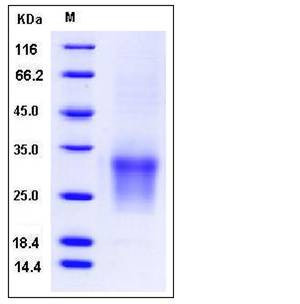Human CD82 / KAI-1 Protein (His Tag)
4F9,C33,GR15,IA4,KAI1,R2,SAR2,ST6,TSPAN27
- 100ug (NPP3715) Please inquiry
| Catalog Number | P12275-H08H |
|---|---|
| Organism Species | Human |
| Host | Human Cells |
| Synonyms | 4F9,C33,GR15,IA4,KAI1,R2,SAR2,ST6,TSPAN27 |
| Molecular Weight | The secreted recombinant human CD82 consists of 129 amino acids and has a predicted molecular mass of 15 kDa. In SDS-PAGE under reducing conditions, the apparent molecular mass of the protein is approximately 25-33 kDa due to glycosylation. |
| predicted N | Gly 111 |
| SDS-PAGE |  |
| Purity | > 90 % as determined by SDS-PAGE |
| Protein Construction | A DNA sequence encoding the second extracellular domain of human CD82 (P27701-1) (Gly 111-Leu 228) was fused with a polyhistidine tag at the C-terminus and a signal peptide at the N-terminus. |
| Bio-activity | |
| Research Area | Immunology |Adaptive Immunity |T Cell |T Cell CD Antigen |
| Formulation | Lyophilized from sterile PBS, pH 7.4 1. Normally 5 % - 8 % trehalose, mannitol and 0.01% Tween80 are added as protectants before lyophilization. Specific concentrations are included in the hardcopy of COA. |
| Background | CD82, also known as KAI-1, structurally belongs to tetraspanin family while categorised as metastasis suppressor gene on functional grounds. KAI1/CD82 is localized on cell membrane and form interactions with other tetraspanins, integrins and chemokines which are respectively responsible for cell migration, adhesion and signalling. Downregulation of CD82 expression is associated with the advanced stages of many human cancers and correlates with the acquisition of metastatic potential. Recent studies suggest that complex mechanisms underlie CD82 loss of function, including altered transcriptional regulation, splice variant production and post-translational protein modifications, and indicate a central role for CD82 in controlling metastasis as a 'molecular facilitator'. The loss of KAI1/CD82 expression in invasive and metastatic cancers is due to a complex, epigenetic mechanism that probably involves transcription factors such as NFkappaB, p53, and beta-catenin. A loss of KAI1 expression is also associated with the advanced stages of many human malignancies and results in the acquisition of invasive and metastatic capabilities by tumour cells. Thus, KAI1/CD82 is regarded as a wide-spectrum tumor metastasis suppressor. |
| Reference |
